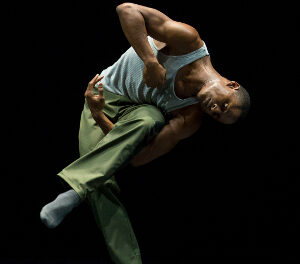Tuesday night’s Eastern Music Festival chamber music concert certainly started out with an explosion — Trio per uno, a work for three percussionists written by Serbian composer Nebojsa Zivkovic (b. 1962). This is a lively and exciting three-movement work that demands the utmost precision from the three musicians who play a wide variety of instruments, from bongos and vibraphones to wind chimes and Peking opera tuned bells. The trio — John Shaw, Wiley Sykes, and Nathaniel Collins — played with energy and amazing accuracy.
The trio decided to rearrange the order of the movements, starting with the third movement and concluding with the first. According to the program notes, Zivkovic specializes in percussion music for a single performer, and the Trio has lots of “unison” material, thus approximating one percussionist. This was certainly true in the first movement, where all three musicians mostly played exactly the same material on the same type drums, with vocal shouts adding still more fire to the fast pace.
The slow second movement began with a hypnotic repeated pattern on one vibraphone played by Sykes, soon joined by an interlocking pattern on another, played by Collins. Shaw then added some contrasting color with a rainstick, wind chimes, bells, and a bowed cymbal; very evocative.
The finale had all three percussionists gathered around the bass drum which each struck as unexpected exclamations, augmenting the considerable sounds coming from the bongos and other percussion instruments each was playing. The result was as dramatic as the thunderstorm that was brewing outside of the Carnegie Room of the Hege Library on the Guilford College campus, which is where the Eastern Music Festival is housed for the summer.
Johannes Brahms’ Clarinet Trio in A minor, Op. 114 is a mature four-movement work for clarinet, cello, and piano played Tuesday night by Shannon Scott, Marta Simidtchieva, and Yoshikazu Nagai, respectively. Some critics, while praising the Trio’s formal structure, find fault with the melodic appeal. I, however, loved hearing the work in the hands of these three musicians who communicated wonderfully throughout the piece, listening and responding to each other’s musical gestures and cues.
Scott’s liquid and beautiful timbre was a delight to hear; her tunes were often long-winded, which she effortlessly spun out and artistically shaped. Simidtchieva provided a firm foundation for the proceedings and when given the main melody, her cello sang, especially lovely in the upper registers. Nagai held everything together with superb sensitivity and technical security.
Robert Schumann wrote three piano trios; the second one, Op. 80 in F concluded the evening’s music making. Husband and wife team John Fadial, violin, and Beth Vanderborgh, cello, was joined by the distinguished American pianist Rebecca Penneys, who is also pianist in residence with EMF this summer.
I suppose that the impulsive nature that characterizes both Schumann the man and the composer is both his distinction and his bane. Those that love this trait are bound to love this Trio. Those that find his sudden change of moods distracting would not be so enthusiastic.
The four movements that comprise the work are chockfull of wonderful tunes (one can hear hints of Brahms in much of the work) and textures that explore tone color and the sound capabilities of the three instruments. The first and last movements begin with a rhythmic drive that is subverted by more dreamy wanderings. The slow second movement features some exquisite passages of amazing rhythmic flexibility, and the delicate third movement is a beauty.
The three musicians provided a lot of energy and spunk. Fadial’s passionate and lyric playing, although not always in tune, was well suited to the nature of the score. Vanderborgh’s cello was fervent and tender by turns, capturing the mercurial essence of Schumann. And Penney’s playing was everything it needed to be — technically secure with plenty of fire when called for, and a superb ear that paid attention to the color and balance of the other two.











